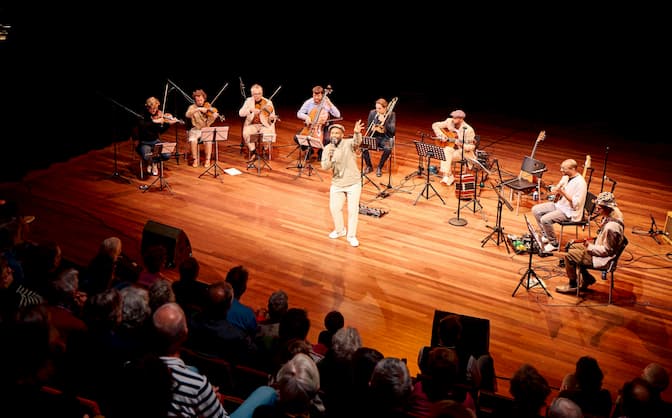Calendar
Filters

De Meervaart, Meer en Vaart 300
Tomorrow & Yesterday
Time travelling with violinist Leonie Bot and saxophonist composer Olaf Zwetsloot in the Meervaart Theatre

Concertgebouw, Amsterdam
Riccardo Chailly conducts Prokofiev
Prokofiev's cantata Alexander Nevsky and the Fourth Symphony
Starting € 29

Concertgebouw, Amsterdam
Riccardo Chailly conducts Prokofiev
Prokofiev's cantata Alexander Nevsky and the Fourth Symphony
Starting € 29

Concertgebouw, Amsterdam
Riccardo Chailly conducts Prokofiev
Prokofiev's cantata Alexander Nevsky and the Fourth Symphony
Starting € 29

Concertgebouw, Amsterdam
Riccardo Chailly conducts Prokofiev
Prokofiev's cantata Alexander Nevsky and the Fourth Symphony
Starting € 20

Concertgebouw, Amsterdam
Iván Fischer leads Dvořák, Smetana and Bernstein
Violinist Guy Braunstein performs The Beatles
Starting € 29

Concertgebouw, Amsterdam
Iván Fischer leads Dvořák, Smetana and Bernstein
Violinist Guy Braunstein performs The Beatles
Starting € 29

Concertgebouw, Amsterdam
Iván Fischer leads Dvořák, Smetana and Bernstein
Violinist Guy Braunstein performs The Beatles
Starting € 29

Bijlmer Parktheater, Amsterdam
Bijlmer Klassiek: Ravel, Anansi & Snijders
Enjoy a world of fairy tales with Ronald Snijders and musicians from the Royal Concertgebouw Orchestra

Concertgebouw, Amsterdam
Romeo and Juliet (6+)
Concert for children aged six and over with Tchaikovsky’s enchanting music
Starting € 11

Concertgebouw, Amsterdam
Romeo and Juliet (6+)
Concert for children aged six and over with Tchaikovsky’s enchanting music
Starting € 11

Concertgebouw, Amsterdam
Klaus Mäkelä conducts the St Matthew Passion
Bach's immortal masterpiece
Starting € 29

Amsterdamzaal, Amsterdam
Children’s Music Day
Go on an adventure with the Concertgebouw Orchestra
Starting € 12.5

Amsterdamzaal, Amsterdam
Children’s Music Day
Go on an adventure with the Concertgebouw Orchestra
Starting € 12.5

Amsterdamzaal, Amsterdam
Children’s Music Day
Go on an adventure with the Concertgebouw Orchestra
Starting € 12.5

Concertgebouw, Amsterdam
Klaus Mäkelä conducts the St Matthew Passion
Bach's immortal masterpiece
Starting € 29

Baden-Baden - Festspielhaus, Baden-Baden
On tour: Klaus Mäkelä conducts the St Matthew Passion
Bach's immortal masterpiece in Baden-Baden

Baden-Baden - Festspielhaus, Baden-Baden
On tour: Klaus Mäkelä conducts Mahler's Fifth
Daniel Lozakovich performs Bruch’s Violin Concerto No. 1

Baden-Baden - Festspielhaus, Baden-Baden
On tour: Klaus Mäkelä leads Bruckner
Anton Bruckner’s monumental Symphony No. 8 in Baden-Baden

Concertgebouw, Amsterdam
Tchaikovsky’s Symphony No. 4
Aurel Dawidiuk conducts Debussy, Poulenc and Tchaikovsky
Starting € 20